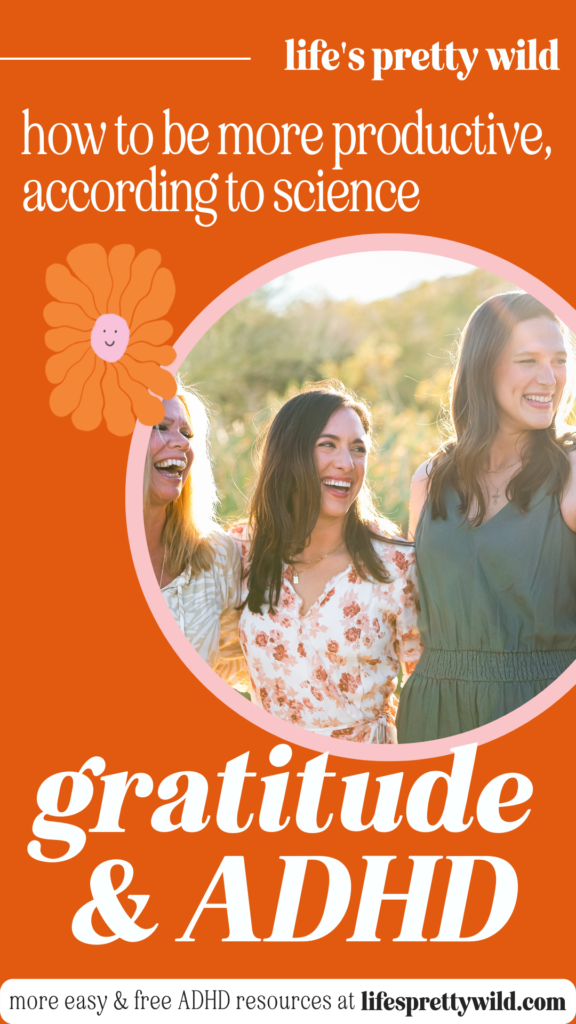
Hold the phones. It seems like we’re always on a quest to boost our health and wellness. We buy the red light therapy lamps. We go to the gym and the sauna. We go all organic. But what if I told you there's one super simple yet extremely effective practice that’s scientifically proven to improve your health and productivity? And it's free. And it only takes a few moments to have life-changing impacts. I’m sure you’d want to know… I’m talking about the science of gratitude.
“But, Ana,” you say to me, “I said thank you to the barista who made my triple-shot-one-caramel-pump-vanilla latte at Starbucks this morning. It didn’t make me any more productive.”
First of all, maybe cool it on the caffeine and sugar first thing in the AM (I say this with love) .
But also, true gratitude, the act of which impacts our brains and physiology, isn’t about throwing out thank you’s willy-nilly all day long.
Gratitude isn’t just an action, or a verbal expression. It’s a mindset, an emotion, a satisfying post-thanksgiving jeans button of mental and physical power just waiting to be unleashed.
My question is: do you live with gratitude in mind, for real, for real? Do you speak gratitude into the universe from your soul? Do you sign the cards, write the letters, scribble in your journal, or simply whisper at least once a day how grateful, truly grateful, you are for being here and being you? ADHD and all. Flaws and all. Mistakes and all.
The Science of Gratitude
Okay so maybe this sounds a little woo-woo to you, but here me out: gratitude is backed by peer-reviewed science to have a tremendous impact on your productivity, mood, and overall health. Check out this study titled “Counting Blessings Versus Burdens: An Experimental Investigation of Gratitude and Subjective Well-Being in Daily Life.”
Researchers split people up into three groups. One focused on looking for the things they were grateful for, another on the hassles in their life, and the third group focused just on recounting events without adding a grateful or negative association to it.
Unsurprisingly, what they found was that the grateful people were happier. Why does this matter for ADHD? Happy people are more productive people.
The study concluded “The gratitude-outlook groups exhibited heightened well-being across several, though not all, of the outcome measures across the 3 studies, relative to the comparison groups. The effect on positive affect appeared to be the most robust finding. Results suggest that a conscious focus on blessings may have emotional and interpersonal benefits.”
Additionally, people in the gratitude group were associated with more prosocial behaviors, including helping someone with a personal problem or providing emotional support.
The Practice of Gratitude: Where the Woo Meets the Work
Here’s where the work meets the woo: Gratitude doesn’t just happen by itself. If you’re a glass half-empty person, you’re going to look at events in your day as if they’re emptying your glass even more. But if you consciously approach your day with a glass-half-full mindset, without ignoring the bad, then every small, good thing that happens to you will fill your glass til your cup spills over.
Here are some actionable — science-backed — steps you can take to bring more gratitude into your headspace:
1. Say “thank you” out loud.
You may feel or understand that something is a good thing, but literally saying out loud – saying the words “thank you” has a tremendous impact. You might feel like a crazy person, but you'll be a happy-productive-crazy person.
It’s only when we express a feeling of gratitude to ourselves (or to God or the universe) that you can build that trust, that relationship. It’s a high-leverage phrase.
2. Write it down.
A 2013 study published in the Journal Psychosomatic Medicine found that expressive journaling — can even help in healing physical wounds. In the study, participants had a tiny wound made on their arms (all’s fair in the name of science, eh?) and researchers then tracked how that wound healed. By day 11, 76% of the group who journaled about upsetting life events had healed, compared to just 42% of those that wrote about time management.
That was just a two-week study. Just imagine the impact that a regular gratitude writing practice would have over your physical and emotional health. And listen, I’m not pretending that writing down what you’re grateful for will magically solve the problems in your life or in our world. But there’s truth in the science of gratitude that we already know, and hope for the proof that we haven’t yet uncovered. And when it comes to emotional well-being, every little bit counts.
3. Phone a friend.
Or send ‘em a text, you digital nomads. Or pay ‘em a visit if you’re old school! The point is to express gratitude to another person. I know it sounds cheesy, but think about it, when was the last time you genuinely thanked a friend just for being your friend? Have you ever done it? We often have relationships we depend on without ever acknowledging how grateful we are for having them. So call up your BFF or your work wife and thank them for sticking around. Lawd knows your ADHD quirks probably make things interesting at times
4. Take the indirect route.
Let’s face it, sometimes our days just suck. And it’s tough to find things to be grateful for. We got a flat tire. Our kids made us late for work. We got a cold email from our boss. We sit down at the end of the day and feel defeated and not at all grateful. Here’s when you can take an indirect approach. Instead of looking for something in your day to be grateful for, pick a neutral topic. Your Peloton: how cool that you get to work out on a badass machine without having to commute to the gym. Your mom: she always swoops in when you need extra childcare. Your favorite plant: dang, that thing is still alive? Blessings and miracles abound.
After a few minutes of this, you’ll be surprised at how much easier it is to transfer that grateful energy into the not-so-pretty areas of your life.
5. Make gratitude the first and last thing every day.
Take just one minute to write or speak what you’re thankful for. Making it a habit of beginning and ending each day with a gratitude practice will reap you benefits ten times over. It’s hard to start a new habit at first, some say it takes about 60 days. But if you commit to that, it’ll come to you naturally, without you having to work as hard. Set a twice-daily alarm. Leave a post-it note on your mirror. Leave your journal out on your nightstand where you can see it.
You can also try habit stacking – say three things you’re grateful for every time you brush your teeth. Or every time you eat something.
For more ways to marry the woo and the work, check out this post on holistic productivity habits! 11 ways to boost memory, focus, and output.
On that note, I’m so grateful to you, dear reader. For taking the time out of your day to visit my blog and for committing to a full life of passion and purpose, despite the challenges ADHD brings. It’s better when we do it together.

Comments +